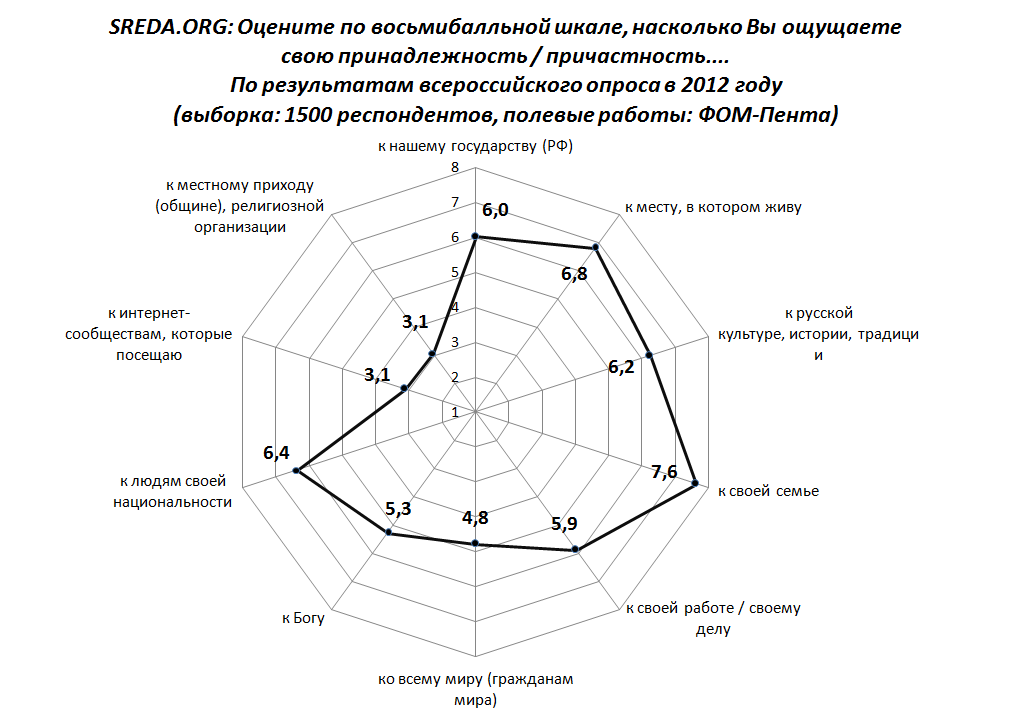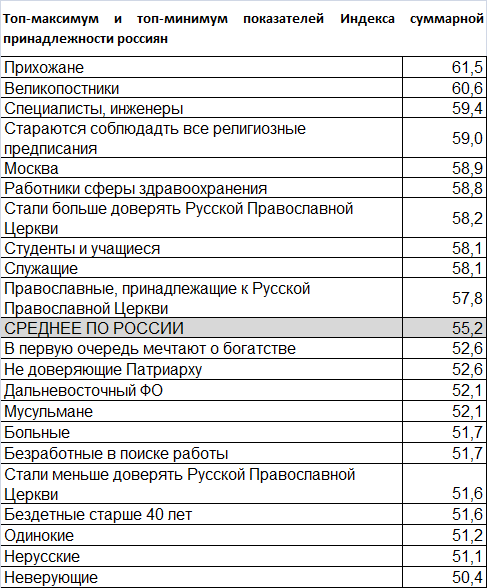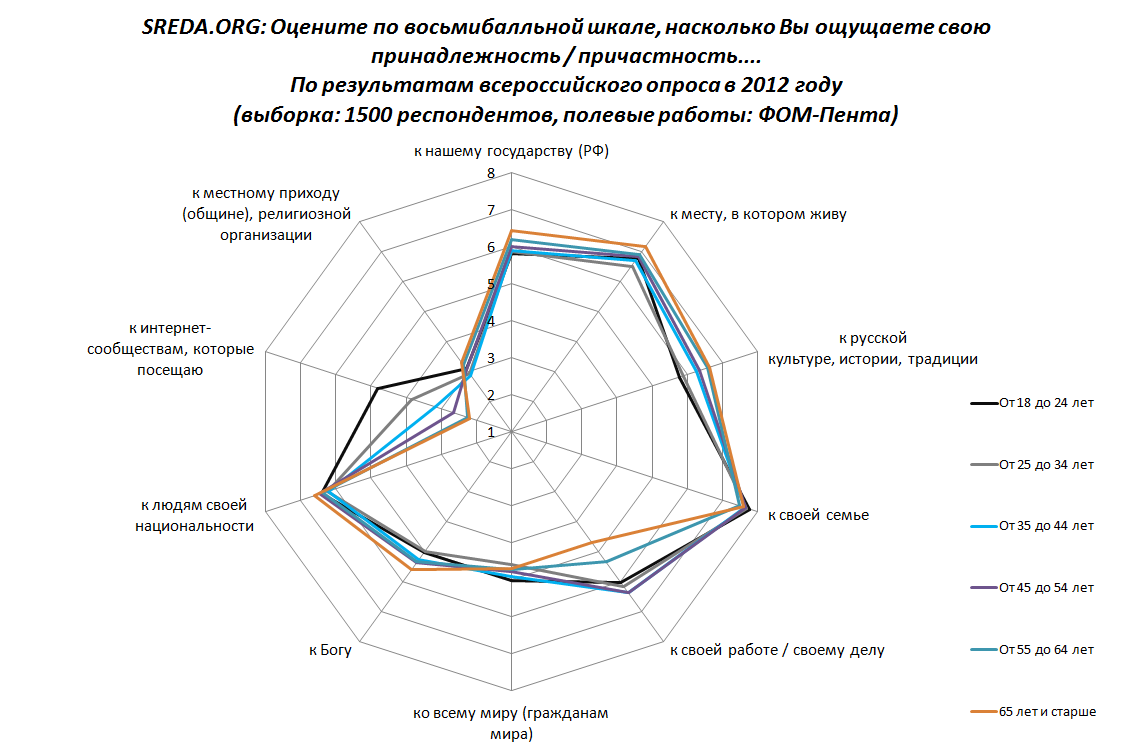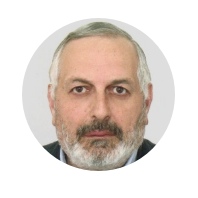Identity. Patriots and potential emigrants
10/17/2012In the next article of Immediate Issues, the research organization Sreda investigates the self-perception of Russians, based on the degree of their belonging to different types of identity. On a scale of 1 to 8, respondents rated the degree of their belonging to family, the state, God, place of residence, work, Russian culture, nationality, parish, online communities, and the world.
According to the results, the mean values were compiled into INDEX of BELONGING (the sum of the average scores on all proposed types of belonging), which made it possible to identify among the respondents the group of “Needed People” (the highest index of belonging) and “Nobody’s People” (the lowest index). People in the first group, according to the research hypothesis, have a higher degree of feeling of belonging for all the types, while “Nobody’s People”, on the contrary, are cut off from any form of belonging. What characteristics are inherent in the selected groups of psychosocial perception; how many of Russians recognize a love of Russia, and how many want to go to another country – read the answers in the following article.
On belonging in general
For Russians, the most powerful sense of belonging is to a family: the degree of the its density is 7.6 points out of a possible 8. The weakest is belonging to religious organizations and Internet-communities (the average Russian respondent equally assesses the degree of belonging to Internet-communities and to parishes: 3.1 points).
INDEX of BELONGING
The table below shows the Index of belonging rating: the 10 groups with the highest value of the Index and the 10 groups with the lowest total score.
“Needed People”
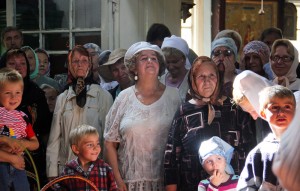 Interesting fact: it turns out that there is a close connection between the Index of belonging and religious practices. Thus, the two most “belonging” groups are those who regularly attend services (total score – 61.5), and observe Lent (overall score 60.6). Also, respondents who observe all religious rules have a high total score (59.0). Those who observe Lent and are those who follow religious rules not only have higher sense of belonging to God and the parish, but also have a stronger sense of belonging to Russian culture. Respondents who regularly attend worship services and those scored the highest total score estimate their belonging to all the proposed types, except for family, work, and Internet-communities. Third place on the sum of the average scores is taken by specialists and engineers (59.4), who evaluate their affiliation above average on all types except the state and place of residence. It is interesting that this group appreciates their belonging to work – 7.1 points compared with 5.9 points on average in Russia. The two other groups of “Needed People” are residents of the capital, whose index was 58.9 points, and healthcare professionals with a total of 58.8 points.
Interesting fact: it turns out that there is a close connection between the Index of belonging and religious practices. Thus, the two most “belonging” groups are those who regularly attend services (total score – 61.5), and observe Lent (overall score 60.6). Also, respondents who observe all religious rules have a high total score (59.0). Those who observe Lent and are those who follow religious rules not only have higher sense of belonging to God and the parish, but also have a stronger sense of belonging to Russian culture. Respondents who regularly attend worship services and those scored the highest total score estimate their belonging to all the proposed types, except for family, work, and Internet-communities. Third place on the sum of the average scores is taken by specialists and engineers (59.4), who evaluate their affiliation above average on all types except the state and place of residence. It is interesting that this group appreciates their belonging to work – 7.1 points compared with 5.9 points on average in Russia. The two other groups of “Needed People” are residents of the capital, whose index was 58.9 points, and healthcare professionals with a total of 58.8 points.
“Nobody’s People”
 Along with the Russians who have strong sense of belong to different proposed types, we can also observe the groups with the lowest total score. It is also connected to religiosity: the lowest index was obtained by the non-believers group – 50.4 points. Much of this was due to a low estimate of belonging to God (2.3 vs. 5.3 on average in Russia) and religious organizations (1.9 compared to 3.1). Apart from these two points the non-believers evaluate their belonging to the world lower than the average Russian. Interestingly, the lowest total score showed Muslims (52.1) and those who believe in God without attributing themselves to a particular religion (52.8), they estimated belonging lower than the average for all survey items. In the category of “Nobody’s People” there were also respondents who call themselves non-Russians (51.1), lonely (51.2) or sick (51.7), childless and older than 40 years (51.6), those whose trust of the Russian Orthodox Church in recent years has become less (51.6), and the unemployed(51.7) – all of them value their sense of belonging below the average for all of the proposed items.
Along with the Russians who have strong sense of belong to different proposed types, we can also observe the groups with the lowest total score. It is also connected to religiosity: the lowest index was obtained by the non-believers group – 50.4 points. Much of this was due to a low estimate of belonging to God (2.3 vs. 5.3 on average in Russia) and religious organizations (1.9 compared to 3.1). Apart from these two points the non-believers evaluate their belonging to the world lower than the average Russian. Interestingly, the lowest total score showed Muslims (52.1) and those who believe in God without attributing themselves to a particular religion (52.8), they estimated belonging lower than the average for all survey items. In the category of “Nobody’s People” there were also respondents who call themselves non-Russians (51.1), lonely (51.2) or sick (51.7), childless and older than 40 years (51.6), those whose trust of the Russian Orthodox Church in recent years has become less (51.6), and the unemployed(51.7) – all of them value their sense of belonging below the average for all of the proposed items.
FACTS ABOUT BELONGING
Gender: The difference between men and women is shown on three axes: belonging to God, the local parish, and work. Women much more strongly feel belonging to God and value their involvement in religious organizations. Men are more likely to speak of belonging to work.
Age. Age, as shown by radar, is primarily connected with Internet-communities and work – on these axes, we see the maximum stratification. The graph illustrates a pessimistic outlook: respondents 18 to 24 years demonstrate both the highest degree of belonging to the Internet and the lowest towards Russian culture and history. While the respondents older than 65 years of age have strongest belonging to God, Russian culture and traditions, their own nationality, and the state. In general, with age decreasing, we see a tendency to weaken the self-identification of the respondents’ belonging to all proposed types, with the exception of Internet-communities.
Education. This radar, drawn for groups with different levels of education, shows a high stratification at the axis of belonging to work: the higher the education level, the higher is belonging to work. It is also interesting that respondents with higher education can be attributed as “Needed People”: almost on every axis they have the highest mark. 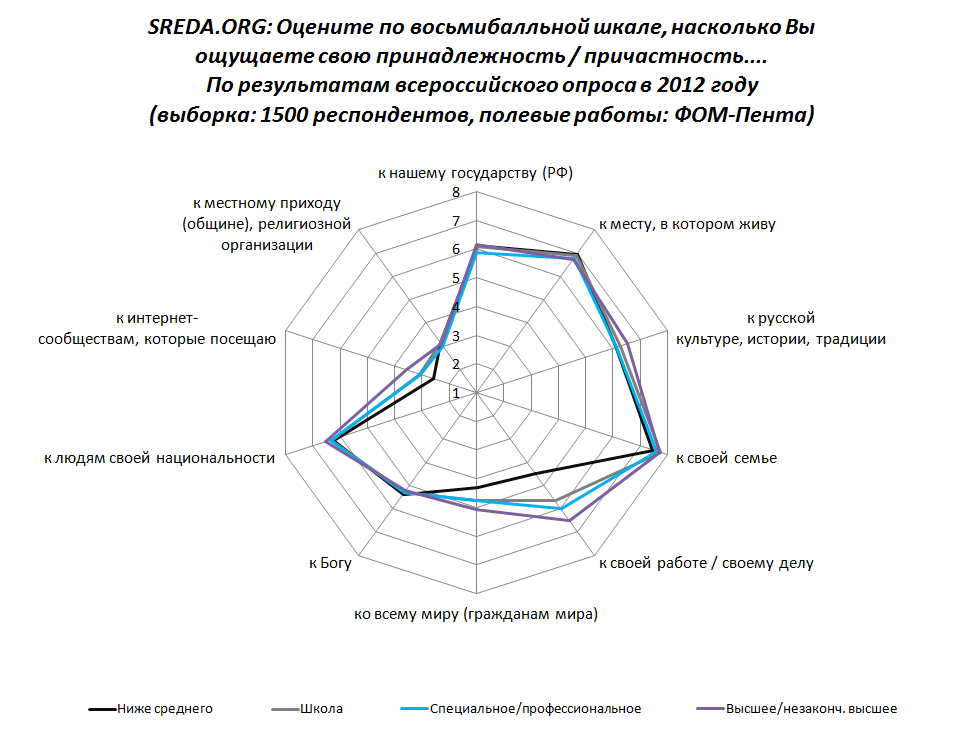 Income. As in the case of education, income has a direct impact on belonging to work, demonstrated by the chart: the higher the income, the higher the belonging to work. At the same time the wealthiest respondents demonstrate their detachment from their “roots”: their belonging to their place of residence, the state and the culture is minimal. An interesting finding is the fact that neither income nor education has any influence on the respondents’ belonging to religious organizations.
Income. As in the case of education, income has a direct impact on belonging to work, demonstrated by the chart: the higher the income, the higher the belonging to work. At the same time the wealthiest respondents demonstrate their detachment from their “roots”: their belonging to their place of residence, the state and the culture is minimal. An interesting finding is the fact that neither income nor education has any influence on the respondents’ belonging to religious organizations.  Location. Muscovites, as mentioned above, turned out to be “Needed People”: their belonging to the majority of the axes is significantly higher than in other places. At the same time, the group “Nobody’s people” includes residents of small cities and towns, whose belonging to most of the axes is generally somewhat lower. We can assume that this is due to the gradual extinction of small settlements, abandoned in the economic chaos. This is interesting, that inhabitants of megacities estimate a low sense of belonging to local congregations and religious organizations.
Location. Muscovites, as mentioned above, turned out to be “Needed People”: their belonging to the majority of the axes is significantly higher than in other places. At the same time, the group “Nobody’s people” includes residents of small cities and towns, whose belonging to most of the axes is generally somewhat lower. We can assume that this is due to the gradual extinction of small settlements, abandoned in the economic chaos. This is interesting, that inhabitants of megacities estimate a low sense of belonging to local congregations and religious organizations. 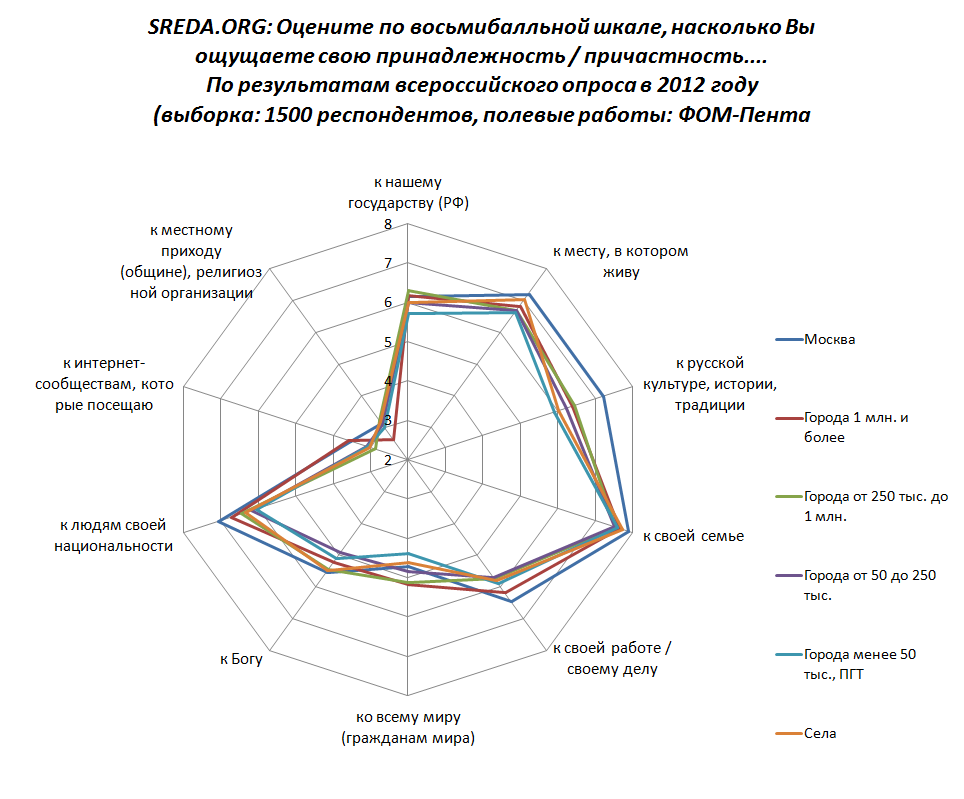 Federal District. This radar, stratified by the Federal districts, in general, does not show any significant deviations with the exception of a few interesting moments. As such, the residents of the Far Eastern District show low values on the half of radar axis, and they partly can be attributed to the group of “Nobody’s people.” In contrast, the response graph of the Central District residents often finds itself in the position of the highest values, including the axes of belonging to Russian culture and to people of their own nationality. On the axis of religious organizations there is an obvious separation of two federal districts, Siberia and the Urals: in these regions, the level of belonging to parishes and God is minimal.
Federal District. This radar, stratified by the Federal districts, in general, does not show any significant deviations with the exception of a few interesting moments. As such, the residents of the Far Eastern District show low values on the half of radar axis, and they partly can be attributed to the group of “Nobody’s people.” In contrast, the response graph of the Central District residents often finds itself in the position of the highest values, including the axes of belonging to Russian culture and to people of their own nationality. On the axis of religious organizations there is an obvious separation of two federal districts, Siberia and the Urals: in these regions, the level of belonging to parishes and God is minimal. Religion. Non-believers, as already mentioned, have a minimal index of belonging due to extremely low ratings of belonging to God and religious organizations. Muslims also have a low index, and show the lowest mark on most of the radar axes (except for belonging to people of their own nationality). By the way, contrary to the stereotype of the mosque activity of Muslims, they feel a lower sense of belonging to local religious organizations, than Orthodox respondents. Orthodox followers, when compared with other religions, are “Needed People”, which can be seen on the radar. They rate higher not only their belonging to God, but also to all other points of the survey – with the exception of work –where the maximum rate is expressed by Christians who do not consider themselves a part of any denomination.
 Political views. This radar is drawn for the groups selected on the basis of political affiliation, and in general does not reveal significant differences, however, it points out a few interesting facts. Putin’s voters are on the contrary to Zhirinovsky’ voters: supporters of Putin show high belonging to God and the state, and supporters of Zhirinovsky – the lowest. Zhirinovsky voters feel weak belonging to the Russian culture. The highest belonging to the parish is shown by supporters of Sergei Mironov. Voters of Mikhail Prokhorov demonstrate high belonging to Unternet-communities and work. Communists have weak belonging to Internet communities and the world; while at the same time have the highest local belonging (belonging to the place in which they live).
Political views. This radar is drawn for the groups selected on the basis of political affiliation, and in general does not reveal significant differences, however, it points out a few interesting facts. Putin’s voters are on the contrary to Zhirinovsky’ voters: supporters of Putin show high belonging to God and the state, and supporters of Zhirinovsky – the lowest. Zhirinovsky voters feel weak belonging to the Russian culture. The highest belonging to the parish is shown by supporters of Sergei Mironov. Voters of Mikhail Prokhorov demonstrate high belonging to Unternet-communities and work. Communists have weak belonging to Internet communities and the world; while at the same time have the highest local belonging (belonging to the place in which they live).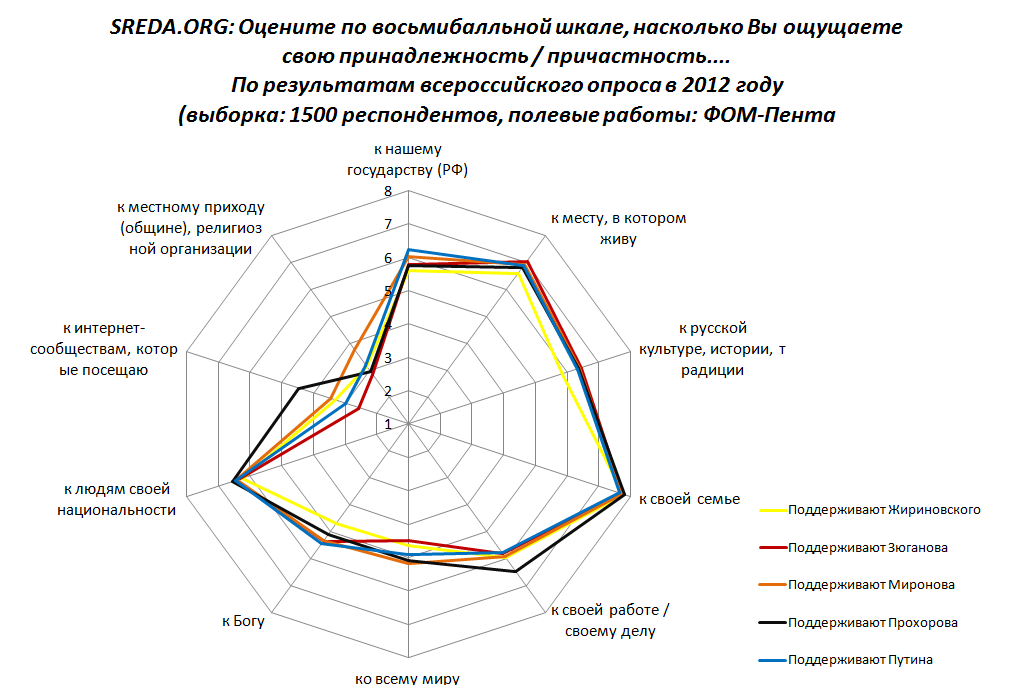
Who loves Russia? And who would like to live in another country?
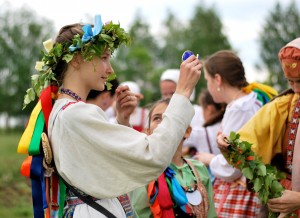 Slightly more than half of respondents expressed a love for Russia – 56%, while 8% of respondents said they would like to live in another country. Those who love Russia were the respondents engaged in charity (75%), with active civil posotion (71%), and observers of Lent (69%). Also, more likely to express a love for Russia were retired pensioners, residents of cities with a population of between 50 and 250 thousands, and respondents in the lowest income.
Slightly more than half of respondents expressed a love for Russia – 56%, while 8% of respondents said they would like to live in another country. Those who love Russia were the respondents engaged in charity (75%), with active civil posotion (71%), and observers of Lent (69%). Also, more likely to express a love for Russia were retired pensioners, residents of cities with a population of between 50 and 250 thousands, and respondents in the lowest income.
Those least likely to love Russia were people from cities with a population of 250 thousand to one million ( 40% in total). Also, salesmen, residents of the Northwest District, and Prokhorov’ voters were slightly less likely than the average to say they love Russia. Pessimistic observations: students and pupils most of all want to leave Russia (23%), the same with voters for Prokhorov, Muslims, and non-Russians. On the contrary, elderly respondents are not eager to leave the country – only 1% of respondents over 65 had such desire. Those who observe Lent and who have many children also don’t want to leave.
FACT: 37% of respondents say they love Russia but would like to live in another country. The index of belonging for those “loving Russia” is 56.9 points and exceeds the national average, while for the “potential emigrants” it is at 54.6 points, which is less than the average in Russia. It is interesting that potential immigrants show weak belonging to all proposed types except the Internet communities (3.8 points compared with 3.1 points for Russia).
PHOTO: MUSTAFINA EUGENE, KOZHUKHOVA CATHERINE, YAHOVICH BORIS, NEUSTROEVA SOFIA
The results are based on data from the All-Russian representative survey (field work: FOM-Penta, sample 1500), in which the Russians were asked to answer the following questions:
- Rate on an eight point scale how you evaluate your belonging/involvement …
- 1. … To our state (the Russian Federation).
- 2. … To the place where you live.
- 3. … To Russian culture, history and traditions.
- 4. … To your family.
- 5. … To your work
- 6. … To the whole world (citizens of the world).
- 7. … To God.
- 8. … To the people of your own nationality.
- 9. … To Internet communities that you visit.
- 10. … To the local parish (community, congregation), religious organization.
- Please select the statements that are appropriate for you:
- 1. I love Russia
- 2. I want to live in another country


